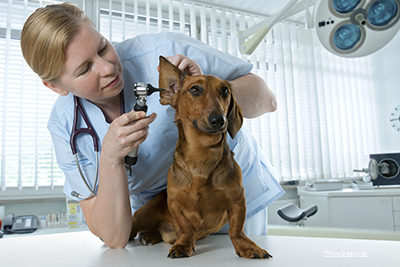
In a previous article, I discussed hearing loss in dogs. Some of you might be wondering if hearing aids are available for (and used successfully) in dogs. The answer is yes but, unfortunately, not used often.
Over the years, many attempts have been made to develop and to perfect hearing aids for dogs. An Internet search on the topic might lead you to believe that canine hearing aids are readily available and commonly used. However, after requesting documents from Dr. Peter Scheifele at the Communication Sciences and Disorders Department at the University of Cincinnati Fetch~Lab, I learned they are apparently the only ones in the world who currently fit canine hearing aids. According to Dr. Scheifele's documents, there are some key points to mention when considering canine hearing aids.
- Hearing aids do not restore hearing to its former level nor to its original quality1. This means that there is a limit to the amount of sound that can be delivered into the ear through the device. And there is also distortion of the amplified sound along with increased background noise transmitted in the process. People with hearing aids are aware of what is going on and are highly motivated to identify and to adapt to the new sounds. Dogs are not.
- Getting a dog to wear a hearing aid and then teaching him to interpret the sounds and to relearn their meanings requires a great deal of constant and consistent habituation and training1. You do not just fit the hearing aids and resume your life as it was before. The whole family has to adjust their behavior to assist the dog in a long and difficult process – that may or may not be ultimately successful. This means that you, the guardian, must be a skilled trainer or be prepared to work closely with one. The dog also needs to be well trained and a compliant animal2.
- Hearing aids cost about $3,000 to $5,000 and there are no guarantees1. If you want to try hearing aids for your dog, talk with your veterinarian.
The steps involved are these2:
- Your dog must have a diagnostic and hearing test performed.
- An evaluation is done to determine if you and your dog are good candidates.
- Ear molds are made.
- The hearing aids are created.
- The devices are fitted and fine-tuned.
If you are not interested in hearing aids for your dog, the good news is that dogs do not ‘suffer’ from hearing loss the way people do for a multitude of reasons. For one, when hearing loss comes on slowly, dogs adapt. And part of the reason why they can adapt to their loss of hearing is because dogs rely more heavily on their sense of smell than on their ability to hear. (That’s why they smell other dogs when they meet them, and that’s why we can use them to locate everything from missing children to hidden drugs to a urine sample from a patient with bladder cancer.) Hearing for them is a lesser sense. So even with diminished hearing, your dog can still enjoy a happy life.
If you have any questions or concerns, you should always visit or call your veterinarian -- they are your best resource to ensure the health and well-being of your pets.
Resources:
- University of Cincinnati. Communication Sciences and Disorders Department. Basic Information Regarding Canine Hearing Aids (C-HA). Peter M. Scheifele, PhD. 16 Jan. 2015.
- Lesa, Scheifele, John Greer Clark, PhD, and Peter M. Scheifele, PhD. "Canine Hearing Loss Management." The Veterinary Clinics of North America. Small Animal Practice 42(6) (2012): 1225-239. Web. 16 Jan. 2015.
